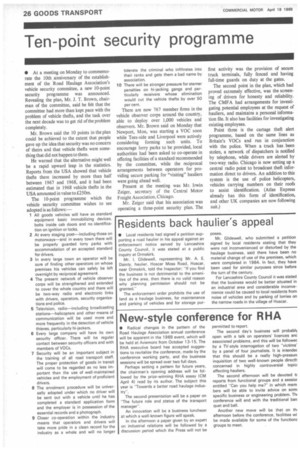Ten-point security programme
Page 28

If you've noticed an error in this article please click here to report it so we can fix it.
• At a meeting on Monday to commemorate the 10th anniversary of the establishment of the Road Haulage Association's vehicle security committee, a new 10-point security programme was announced. Revealing the plan, Mr. J. T. Brown, chairman of the committee, said he felt that the committee had more than kept pace with the problem of vehicle thefts, and the task over the next decade was to get rid of the problem completely.
Mr. Brown said the 10 points in the plan could be achieved to the extent that people gave up the idea that security was no concern of theirs and that vehicle thefts were something that did not happen to them.
He warned that the alternative might well be a rapid upward leap in the statistics. Reports from the USA showed that vehicle thefts there increased by more than half between 1967 and 1968, and it had been estimated that in 1968 vehicle thefts in the USA amounted in value to £250m.
The 10-point programme which the vehicle security committee wishes to see adopted is as follows:
1 All goods vehicles will have as standard equipment basic immobilizing devices. bolts inside cab doors and no identification on ignition or locks.
2 At every staging post—including those on motorways—and in every town there will be properly guarded lorry parks with accommodation of an accepted standard for drivers.
3 In every large town an operator will be sure of finding other operators on whose premises his vehicles can safely be left overnight by reciprocal agreement 4 The present network of vehicle observer corps will be strengthened and extended to cover the whole country and there will be two-way radio and electronic links with drivers, operators, security organizations and police.
5 Television, radio—including broadcasting stations—helicopters and other means of communication will be used more and more frequently in the detection of vehicle thieves, particularly hi-jackers.
6 Every large company will have its own security officer. There will be regular contact between security officers and with members of VOCs.
7 Security will be an important subject in the training of all road transport staff. The proper protection of goods in transit will come to be regarded as no less important than the use of well-maintained vehicles and the employment of proficient drivers.
8 The enrolment procedure will be universally adopted under which no driver will be sent out with a vehicle until he has completed a standard application form and the employer is in possession of the essential records and a photograph.
9 Closer co-operation within the industry means that operators and drivers will take more pride in a clean record for the industry as a whole and will no longer tolerate the criminal who infiltrates into their ranks and gets them a bad name by association.
10 There will be stronger pressure for sterner penalties on hi-jacking gangs and particularly receivers whose elimination would cut the vehicle thefts by over 50 per cent.
There are now 767 member firms in the vehicle observer corps around the country, able to deploy over 1,000 vehicles and observers. Mr. Brown said on Monday that Newport, Mon, was starting a VOC soon while Tees-side and Liverpool were actively considering forming such units. To encourage lorry parks to be provided, local authorities had been asked to co-operate in offering facilities of a standard recommended by the committee, while the reciprocal arrangements between operators for providing secure parking for "visitinghauliers were going ahead well.
Present at the meeting was Mr. Irwin Zeiger, secretary of the Central Motor Freight Association, Chicago.
Mr. Zeiger said that his association was operating a three-point security plan. The first activity was the provision of secure truck terminals, fully fenced and having full-time guards on duty at the gates.
The second point in the plan, which had proved extremely effective, was the screening of drivers for honesty and reliability. The CMFA had arrangements for investigating potential employees at the request of hauliers, and maintains a personal information file. It also has facilities for investigating existing employees.
Point three is the cartage theft alert programme, based on the same lines as Britain's VOCs and run in conjunction with the police. When a truck has been stolen, a network of dispatchers is notified by telephone, while drivers are alerted by two-way radio. Chicago is now setting up a central radio point to broadcast theft information direct to drivers. An addition to this system is the use of police helicopters, vehicles carrying numbers on their roofs to assist identification. (Atlas Express already has this form of identification, and other UK companies are now following suit.)
































































































































